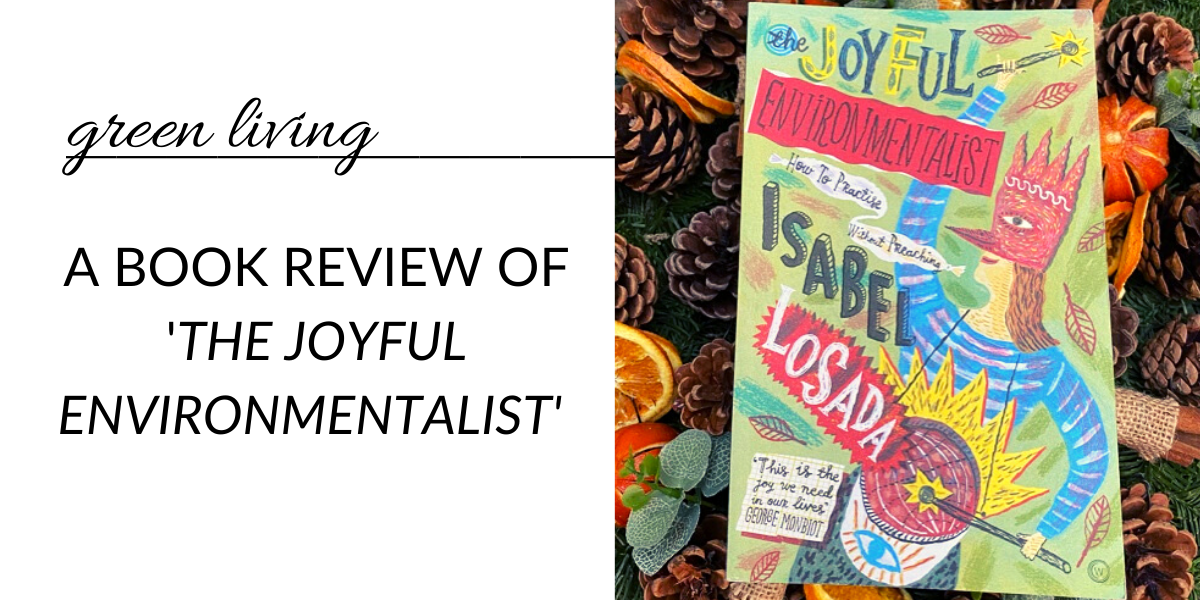I really enjoy reading, especially books about environmentalism! I’ve been into caring for the environment for many years now – I think it all started with my upbringing on a farm and being connected to “the land”.
So when I find a good book about the environment, I want to shout it from the rooftops. And hence this write-up about Isabel Losada’s The Joyful Environmentalist.
This is the first book I’ve ever read by this author, and I was really in for a treat! I love her witty sense of humour and the way she writes as if you are right there with her as she teaches how to bring more environmentalism into our various areas of our lives.
The book is divided into different chapters that delve into various green living themes, like “plastic”, “earth”, “energy”, “food”, “travel”, “wine”, etc. Under these themes, the author chooses specific topics to dive into further, such as how the soap or clothes we buy can impact the environment, or how our travel habits and our addiction to single-use plastics are taking a toll on the planet.
Being super into food and agriculture, my personal favourite chapters of her book are those that cover these topics specifically. She writes about how eating a plant-based diet is one of the best things we can do to help the planet, whether we like to face this fact or not:
“We have to be radical here. We’re not messing about. Our environment is in trouble. Behaviour change is required. Not other people’s behaviour – that’s their job. Just our own.”
In the following chapter, she writes about how difficult it can be to find locally-grown produce in the UK that isn’t “sold in plastic, is grown in the UK and is organic”. She goes to major supermarkets in her local area, but is not successful apart from a few stores.
However, she discovers a company called Riverford, an organic produce delivery/subscription company in the UK. She then goes to interview the founder, Guy Singh-Watson. This is perhaps my favourite conversation of the many in the book (if I had to pick one), as the two speak about the importance of buying organic food for the environment. At the start of the interview, Guy points out how he realizes organic isn’t an end-all and be-all solution, but how it’s still the “best show in town”:
“I’m never going to claim that “organic” has all the answers or that it’s the only answer. There are some arguments for chemicals in agriculture and organic isn’t perfect. However, I do think it’s the best show in town because it’s the only mark, the only methodology that communicates, in a way that is trusted, what is happening on the farm. It gives customers the opportunity to exert their preferences and choices about the way that land is farmed.”
On the subject of how organic food is often more expensive, Guy points out how we need to change our thinking when it comes to the cost of good quality, organic food:
“The only way that we can get away from this is if we start internalizing because conventional agriculture places on all of us in terms of pollution, loss of wildlife loss of biodiversity and climate change. If we counted all this then organic food would be cheap.”
I just love their conversation, and how the author takes us with us as she reasons in her own mind why organic food is a better choice for the planet:
“And I think to myself while I watch the bees buzzing around the herbs [at the Riverford farm], ‘Yes, this is where I want to buy my food from and this is the way that I want tot eat. And if it’s more expensive, at least I’m caring for the planet. I’ll save money on not shopping and not flying and I’ll have joyful, tasty food instead.”
I just love this, and I can relate to this myself. I’m not going to lie…I also expect food to be cheaper than it most likely should be at times. It’s our sustenance, after all, and how we choose to grow it definitely has an impact on the environment. Isabel points out how if we all supported organic farming more, “farmers would farm organically and this would have a major impact on slowing biodiversity loss.”
And likewise, if we don’t make a change, then, “more farmers will go on spraying chemicals on the food and this harms the insects, the soil and us.”
The book also brings attention to our wine choices and how they can impact the environment, and Isabel argues in favour of choosing organic and biodynamic wine as well. She puts it simply:
“If we are going to buy wine and save the planet we need to buy organic wine.”
Without surprise, the author also points out how organic cotton (for our clothing) is the better choice as well, as cotton is the fourth most pesticide-consuming crop.
- buying and using less plastic
- flying less if you can
- not investing in unsustainable businesses that are hurting the planet
- just buying less stuff in general, and second hand if possible
- driving less or not driving if you can
- living in a well insulated home
- being a climate activist and speaking up when it comes to making environmental choices, and boycotting businesses that don’t prioritize the environment
These are all things that make sense to me, and The Joyful Environmentalist lays them out in a funny yet rational, down-to-earth way. I really recommend this book as a light-hearted and entertaining read about something as pressing as saving the planet.
For more information about this book, visit the author’s, Isabel Losada’s, website here: https://www.isabellosada.com/the-joyful-environmentalist.

